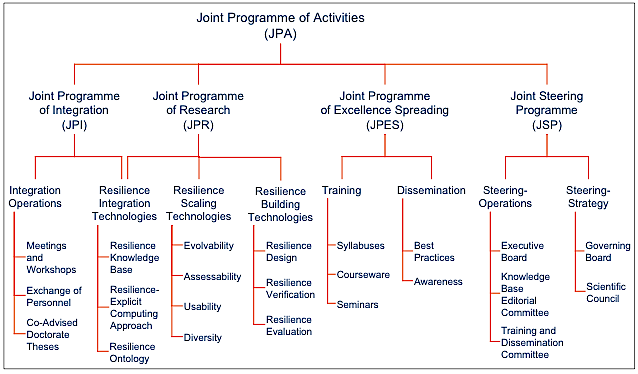Resilience for Survivability in IST (RESIST)
RESIST is an NoE that addresses the strategic objective "Towards a global dependability and security framework" of the EU Work Programme, and responds to the stated need for resilience, self-healing, dynamic content and volatile environments.
It integrates leading researchers active in the multidisciplinary domains of Dependability, Security, and Human Factors, in order that Europe will have a well-focused coherent set of research activities aimed at ensuring that future ubiquitous computing systems, the immense systems of ever-evolving networks of computers and mobile devices which are needed to support and provide Ambient Intelligence (AmI), have the necessary resilience and survivability, despite any residual development and physical faults, interaction mistakes, or malicious attacks and disruptions.
EU Network of Excellence Project (IST-4-026764-NOE)
Period:
2006 - 2008
Partners:
- CENTRE NATIONAL DE LA RECHERCHE SCIENTIFIQUE (France)
- BUDAPESTI MUSZAKI ES GAZDASAGTUDOMANYI EGYETEM (Hungary)
- CITY UNIVERSITY (UK)
- TECHNISCHE UNIVERSITAET DARMSTADT (Germany)
- DEEP BLUE (Italy)
- INSTITUT EURECOM (France)
- FRANCE TELECOM (France)
- IBM RESEARCH GMBH (Switzerland)
- UNIVERSITE DE RENNES 1 (France)
- UNIVERSITE PAUL SABATIER - TOULOUSE III (France)
- VYTAUTO DIDZIOJO UNIVERSITETAS (Lithuania)
- FUNDACAO DA FACULDADE DE CIENCIAS DA UNIVERSIDADE DE LISBOA (Portugal)
- UNIVERSITY OF NEWCASTLE UPON TYNE (UK)
- UNIVERSITA DI PISA (Italy)
- QINETIQ LIMITED (UK)
- UNIVERSITA DEGLI STUDI DI ROMA "LA SAPIENZA" (Italy)
- UNIVERSITAET ULM (Germany)
- UNIVERSITY OF SOUTHAMPTON (UK)
Project aim:
The objectives of the Network are:
- Integration of teams of researchers so that the fundamental topics concerning scalably resilient ubiquitous systems are addressed by a critical mass of co-operative, multi-disciplinary research.
- Identification, in an international context, of the key research directions (both technical and socio-technical) induced on the supporting ubiquitous systems by the requirement for trust and confidence in AmI.
- Production of significant research results (concepts, models, policies, algorithms, mechanisms) that pave the way for scalably resilient ubiquitous systems.
- Promotion and propagation of a resilience culture in university curricula and in engineering best practices

Further information: András Pataricza, Ph.D.


